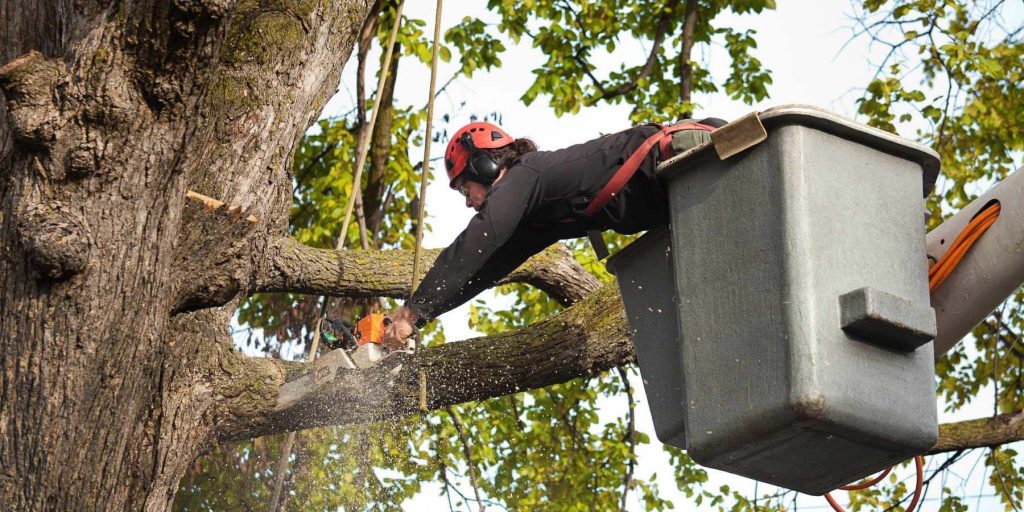Environmental Impacts of Tree Removal
When we cut down trees, the ecosystems face big problems. Animals lose their homes, there are fewer different kinds of plants and animals, and they all have to fight more for what they need to survive.
The soil gets worse, losing nutrients that plants need to grow. This also causes more erosion, making landslides more likely and harming water quality. With fewer trees, there’s less carbon capture, which means more emissions and bigger problems with climate change.
Cutting trees affects local climates too by changing temperatures, rain patterns, and air quality. Removing trees doesn’t just hurt nature; it also affects our own quality of life.
Habitat Loss
Habitat loss frequently occurs due to activities such as tree removal in Pinellas Park, FL, where cutting down trees disrupts the natural homes of wildlife and fragments ecosystems. This forces animals to abandon their habitats and seek new ones. As trees vanish, the animals that rely on them for food and shelter are left vulnerable. This problem has cascading effects not only on individual species but also on the entire food chain in the region.
As animals move, the places they move to can become too crowded. This leads to more competition for food and space, and sometimes animals from different places might even fight over resources.
When we remove trees, the effects can spread far beyond just that place. Animals have to find new homes, which can mess up other ecosystems too. Losing trees also means we lose biodiversity, and some species might even face extinction if they can’t adapt to new environments. That’s why it’s crucial to think about how cutting down trees affects the environment. We need to keep our ecosystems balanced and healthy.

Soil Degradation
Removing trees can harm the soil because it messes up the balance of the ecosystem and the way nutrients move around. This can make the soil less healthy and fertile, which affects the whole ecosystem.
Here are some ways how cutting down trees can cause soil degradation:
- Essential: Trees are very important for nutrient cycling. They take nutrients from the soil and give them back when their leaves and branches break down. Without trees, the soil can lack nutrients, which affects how plants grow and the health of the ecosystem.
- Vital: Trees also help control the water cycle. They absorb and release water through their roots. When there are no trees, the soil can’t hold as much water. This leads to more runoff and can cause waterlogging problems.
- Critical: Cutting down trees can make the soil compact, especially if people use heavy machines. Compact soil makes it hard for roots to grow and decreases soil fertility. This affects the ecosystem’s ability to support different plants and animals.
Increased Erosion Risk
When we cut down trees, the soil becomes much less stable. This happens because the roots that used to hold the soil tightly are no longer there.
As a result, erosion can happen more easily. This erosion doesn’t just change the landscape; it also harms the variety of life in that ecosystem.
Soil Destabilization Risk
When we cut down trees, it makes the soil less stable. This can lead to more erosion in those areas. The unstable soil can harm the environment, change the landscape, and affect the ecosystem in different ways.
Here are three main problems caused by soil destabilization when we remove trees:
- Landslide Prevention: Trees are very important because their roots help hold the soil in place. If we remove the trees, there’s nothing left to keep the soil stable. This can be particularly dangerous on hillsides where landslides could happen more easily.
- Erosion Control: The roots of trees also keep the soil particles together. This helps prevent the soil from being washed or blown away by water and wind. When there are no trees, the soil can easily erode. This erosion can carry soil into rivers and lakes and remove the nutrient-rich top layer of the soil.
- Water Retention, Nutrient Cycling: Trees help the soil hold onto water and they also add nutrients back into the soil through their fallen leaves and decaying roots. Removing trees can stop these processes, which hurts the health of the ecosystem.
Loss of Root Systems
Removing trees significantly increases the risk of soil erosion because their roots are crucial for keeping the soil stable. These roots hold the soil tightly and help absorb water. This reduces the water runoff that can cause erosion when it rains heavily. Once we cut down trees, these benefits disappear, and the soil can easily wash away.
Additionally, tree roots are important for the health of the ecosystem because they cycle nutrients. When roots break down, they release organic matter and nutrients into the soil, which enriches it and helps other plants grow.
If we remove these roots, the soil loses these essential nutrients, which can harm the health of the whole ecosystem.
Impact on Biodiversity
Removing trees increases erosion risks and affects biodiversity in the ecosystem. Here’s how this happens:
- Key Species Displacement: When we take down trees, we destroy the homes of many species. These animals and plants must find new places to live. This often leads to too many living in one area, which can cause fighting over food and space.
- Ecosystem Fragmentation: Cutting down trees can break up ecosystems. This makes it harder for energy and resources to flow smoothly between different areas. It can also keep species from moving freely, making it difficult for them to survive and reducing biodiversity.
- Vital Loss of Genetic Diversity: Trees are crucial for maintaining genetic diversity. Taking them away can reduce the variety of genes needed for species to adapt and evolve. This can disturb the ecological balance and weaken the ecosystem’s ability to handle changes.
When we cut down trees, the ecosystems face big problems. Animals lose their homes, there are fewer different kinds of plants and animals, and they all have to fight more for what they need to survive. The soil gets worse, losing nutrients that plants need to grow. This also causes more erosion, making landslides more…
Recent Posts
- Path to Success Begins with Performance Marketing Expertise
- Exploring the Dark Web’s Potential for Secure Digital Transactions
- Postgraduate Study, Mental Health and Prioritizing Well-Being
- White Borneo Kratom – A Beginner’s Guide to This Powerful Strain
- Hidden Wiki and the Deep Web – An Overview of its Dark Content

